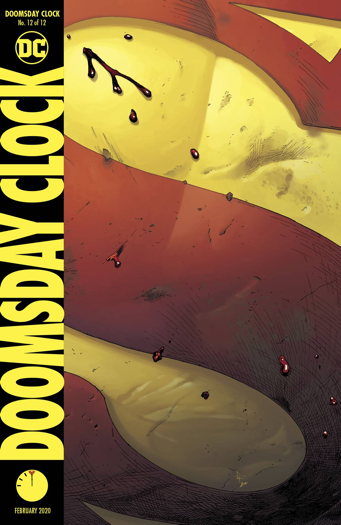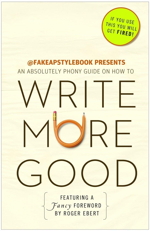Almost used a different word than “futz.”

[SPOILERS for Doomsday Clock #12 ahead]
Last week saw the release — finally — of the last chapter of Doomsday Clock, the extremely popular sales-wise, if internetally-reviled, mini-series intermingling Alan Moore and Dave Gibbons’ Watchmen with the mainline DC Universe. While it feels like DC was pushing this new series as being somehow on par with the original, and while it did superficially ape the look-and-feel, Doomsday Clock will probably ultimately be remembered as “hey, remember that one time DC superheroes were in a comic book that also featured full-frontal male nudity?”
Not that it wasn’t sort of fun and intriguing…the series itself, that is, not just the full-frontal male nudity, though that was sort of amusing in its own right just by how uncomfortable a fit that was with what is basically your standard superhero fare. (As the boys on War Rocket Ajax have pointed out, having Dr. Manhattan’s Lower Manhattan right there for Mary Marvel to see is…something else.)
Anyway, the “fun and intriguing” part. Right. I’ve noted (and demonstrated several times) on this site that I have an ongoing fascination with Watchmen ephemera, the mostly unsupported-by-the-creators tie-ins and exploitations of the property. Doomsday Clock, obviously, is one of those things, yet another bullet point in that long list of what Watchmen has wrought. And while I read and followed along with the story as presented, I have to admit my primary interest wasn’t so much in said story but how they told it, what decisions were made to mix what elements of each milieu and to what purpose. It was the observation of the construction of Doomsday Clock to serve whatever specific purpose it was serving that intrigued, more so than whatever plot threads were offered.
Even so, I do like the idea of “the metaverse,” the idea that the DC Universe reconstructs itself around the continual reinvention of Superman to reflect whatever time period in which he’s published…basically, I’ve been observing the construction of a comic book that itself observes the construction of the fiction in which it exists, which I can’t help but appreciate. I suspect the very same point could have been made without involving the Watchmen characters, but by grabbing remora-like onto the former series for the attention it would bring, perhaps the hope was that the results of this particular event series may have more staying power than most. It would be nice to think that this could be the last word on reboots/relaunches in the DC Universe, that, like the idea of Hypertime before it, anyone reading comics long enough to notice significant changes in continuity should just realize that the in-universe explanation is that “it’s just a thing that happens, man” and requires no more thought or finagling than that, really.
Interestingly, the story itself seems to acknowledge that may not be the case, hypothesizing future “Big Event” series in the DC Universe for decades to come (including, amusingly, at least one that involves the Marvel Universe). Implicit in these Big Events is the idea of providing more in-universe explanations for whatever is happening to the fictional universe at the time due to real-life marketing and editorial decisions…to borrow a turn of phrase from a certainly naked blue guy of some note, “nothing ever ends” — even with the metaverse explanation, more explanations will be forthcoming, regardless.
A week or so ago on the Twitters, I did a short thread about the impact of big crossover event comics at Marvel and DC. Mostly, I was pointing out that Marvel Super Heroes Secret Wars promised big changes that were mostly temporary (Spidey’s black costume possibly being the most significant exception), and even those initial promises were downplayed by the writer himself. In contrast, DC’s contemporaneous Crisis on Infinite Earths promised and delivered big changes…but then spent the next decades backpedaling from what they had done, ironically making its fictional universe far more complicated and convoluted than the previous state of affairs Crisis was supposed to fix.
I wrote a bit about the big changes these series supposedly bring about a couple years into this blog, where you’ll see those same Shooter quotes again, so I don’t need to go into that in too much detail. Crisis, certainly, was the most successful in creating lasting changes, in that it pretty much futzed everything up from then ’til now, with several more series (from Zero Hour to Infinite Crisis to the one being discussed in this very post) trying to deal with its aftereffects. It would be nice if Doomsday Clock‘s “metaverse” idea held fast, changing the way we approach the way this shared universe works, accepting the changes without metatextual event series explaining why the changes, but as I said, even Doomsday Clock itself admits this is futile.
The other big change is that we now have the Legion of Super-Heroes and the Justice Society of America back, but that’s more the reestablishment of a previous status quo…a rolling-back of changes that, again, can be traced back to that original Crisis. There are also some small character bits, too, primarily to Superman’s history and supporting cast, which is fine, but the recasting of Martin Stein as a villain who deliberately created the events that brought about Firestorm kinda stick in my fanboy craw, but What Can You Do?
Possibly the biggest change is that the barrier has been breached: Watchmen characters are fair game for use in the DCU. I mean, they can’t piss off Alan Moore any more, right? I know at some point somebody probably paid some lip service to “this is an important event” and “we don’t use these characters lightly” but I’ve mentioned the idea of Rorschach Team-Up before and I think we all know it’s coming. Plus, there’s that eyeroll of an ending to this series to which someone will not be able to resist slapping together a follow-up. With Before Watchmen in 2012, and this series starting in 2017, I’m guessing Doomsday+1 Clock we can look forward to in the early-to-mid 2020s.








Does the series explain why Superman’s blood is black on the cover? Or was he just underneath a car changing the oil?
Y’know, I was there for the original Crisis, and even then I wondered why they felt the need to tidy things up in-story or in-universe or whatever. I think that’s generally a fan thing rather than a creator thing, like those people who try to explain all the inconsistencies in the Sherlock Holmes or Nero Wolfe stories. Continuity is fine and can be fun, but it needn’t be meticulous. James Bond has been around for a long long time but no one has tried to put all the movies into one shared universe, have they? Oh, what am I saying, I am sure someone has…
I came here to say what Walter just said more effectively, so I second his comment.
I would add: It’s amazing that the DC Universe cohered as well as it did before the original Crisis. Instead of trying to “fix” all the inconsistencies, DC should have celebrated the fact that so many creators worked together so seamlessly for so long.
Although, it occurs to me that DC has been trying to explain its own continuity problems since before Crisis on Infinite Earths. The Earth-1/Earth-2 situation was one in-story explanation for the changes in their primary characters over time. So Crisis on Infinite Earths can be seen as a patch on the previous patch. Turtles all the way down…
Still, I agree that they should leave well enough alone at this point. We’re on what, the 10th patch now? Just tell good stories — that maybe aren’t about previous stories for a change.
James Bond has been around for a long long time but no one has tried to put all the movies into one shared universe, have they? Oh, what am I saying, I am sure someone has…
I believe one popular fan theory is that there is no “James Bond” – it’s a cover identity used by a series of agents from the 60s to the present. And yes, the agent played by Sean Connery is supposed to have retired from the position and returned to it.
Voord 99:
Basically the Peter Sellers CASINO ROYALE explanation! The other option would be that Bond is a Time Lord.
This series sounds absolutely, irredeemably terrible. Everything that Geoff Johns touches at DC is garbage. I’m sure he’s a nice person in real life and I have nothing against him personally, but as a writer (and more significantly, as the (former?) Chief Creative Officer at DC and former head of DC Films (#ReleaseTheSnyderCut)), he is a complete and total hack. The biggest mistake DC has made in the past 25 years was attaching itself to him and his “vision” (which is nothing more than turgid nostalgia mongering aimed at a dwindling fan base, and alienating to new readers/viewers).
I’ll admit it… that scene with the JSA and LSH brought tears to my eyes.
The entire series has been audacious, dare I say worthy of the absurd (almost vulgar) Watchmen sequel concept. I think it’s unnecessary, but it was much better than it had any right to be. In particular issue #9 was awesome. I’d say it’s worth a read for any of the dwindling fanbase mentioned by Daniel, and I’d be interested to read the perspective of a young fan (who’s read Watchmen).
“James Bond has been around for a long long time but no one has tried to put all the movies into one shared universe, have they?”
Since we’re on the subject of Alan Moore, I believe you might find something along those lines in the most recent LoEG volume.
We finally have a definitive answer to “Who would write a better Watchmen story”, Geoff Johns or an elite writers room at HBO. I’m sure Johns loves his wife and is kind to doggies.
Maybe the world needed a scene where Guy Gardner called Doctor Manhattan an asshole and threatened to put underpants on him. Who can say? We live in challenging times.
Writing a Watchmen story about the greatness of Superman is certainly a take, but I believe Mr. Moore substantially covered such matters back in 1986 and he at least had the guts to include Krypto and Mr. Mxyzptlk.
Interesting that both Doomsday Clock and HBO came to the same conclusion (Gaiman’s Law), Dr Manhattan must change or die. He can’t change, so welp.
I truly wish DC had the balls to assign Doomsday Clock to Grant Morrison. If you’re going to diss Moore, go whole hog.I want to see his take on the Watchmen in the DC Universe (and we got a taste of it in Final Crisis).
Super kudos though to Gary Frank, that book is GORGEOUS.
I have two big problems with the “‘James Bond’ is just a code name” theory.
One is that it actually makes the story worse. So, it is one Bond who marries Tracy in ON HER MAJESTY’S SECRET SERVICE, a completely different one who avenges her death in DIAMONDS ARE FOREVER, yet another one who mourns at her grave in FOR YOUR EYES ONLY, and someone unrelated who flinches at being asked if he ever lost someone close to him in THE WORLD IS NOT ENOUGH? You can make up logic to have it that way, but you have reduced the impact of those scenes by about 90%. Why would you want to that?
The other is that this raises the question, Where do you stop? Once, whiling away some idle time by following links, I ended up at the website of someone who tried to tie together every book, movie, TV, and comics series into one shared universe. I happened upon his TV Westerns page, where the claim was made that “James West” and “Artemus Gordon” were code names, assigned to several different men. This was done to not only to reconcile the TV series and the movie WILD WILD WEST, but also to explain away a series of paperback novels that had given the characters different backgrounds than the ones this website’s writer wanted them to have. Well, once you start in that direction–if you explain every inconsistency, or dismiss any detail that is not just as you want, by creating a new character with the same name–where does that end?
By the way, here are some other revelations from that website: Paladin (HAVE GUN WILL TRAVEL) was the son of Long John Silver. Hoss Cartwright (BONANZA) was the great-grandfather of Steve(HAWAII FIVE-0). All the characters played by Lee Majors are related (I am sure it will increase your enjoyment of SIX MILLION DOLLAR MAN to know that Steve Austin had a cousin who was working as the junior partner of Owen Marshall, Counselor at Law.)
Obviously, I meant “Steve McGarrett (HAWAII FIVE-O)” in the previous paragraph.
I should perhaps mention that I came upon this website before the new version of HAWAII FIVE-O appeared. I wonder how its creator reconciles the two versions? Are “McGarrett,” “Danno,” and “Chin Ho” also code-names, or are the new characters the children of the original ones? (And then there are all those Thomas Magnums, Theo Kojaks, and Joe Fridays…once you start down this path, you can never get off.)
One last (I promise) point about the James Bond theory (and, my, how I wandered from Mr. Sterling’s point): If, in regards to this series, one insists “different actor=different character,” then one seems to me to be bound by honor and logic to also insist “same actor=same character.” Thus, for example, if Timothy Dalton and Pierce Brosnan were playing different characters, then the characters played by Joe Don Baker that they met must actually be one man. Explaining how a rogue arms dealer who gets killed can later turn up as a loyal CIA agent in Moscow is difficult, but that is the path one has chosen.
Similarly, Red Grant’s henchman Morzeny is the same person as General Gogol, Scaramanga’s mistress is Octopussy (How did Moore-Bond fail to realize this?), Professor Dent goes from being dead to being head of SPECTRE, and so on. I suppose this does not apply to Charles Grey, as his second appearance was as a post-plastic surgery Blofeld–but why would Blofeld have himself intentionally made a double of a long-dead MI-6 agent?
Why would you want to that?
I think the answer is, essentially, because arguing about these things in the pub is fun.
If you go listen to the Pharos Project archives (one of the Bond episodes), somewhere in there is a case in point. That’s where I first encountered the theory. Not actually in a pub, if I recall correctly, but certainly with a definite element of alcohol involved.
I’ve always found that the most satisfying way to reconcile the discrepancies in the Bond canon is to assume that we’re seeing reconstructions of declassified government material, hence why the redacted material get fleshed out with ephemera contemporary to those who got it from the archives, in an attempt to process a complete narrative on their own terms from action reports about Bond. It’s similar to how any of us doing historical work bring our own biases and assumptions to doing archival and primary document research.